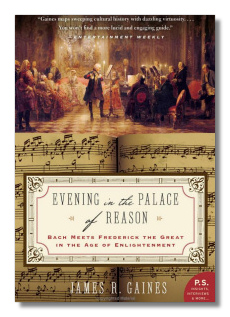
The Internet's Premier Classical Music Source
Related Links
-
Introduction
Acoustics
Ballet
Biographies
Chamber Music
Composers & Composition
Conducting
Criticism & Commentary
Discographies & CD Guides
Fiction
History
Humor
Illustrations & Photos
Instrumental
Lieder
Music Appreciation
Music Education
Music Industry
Music and the Mind
Opera
Orchestration
Reference Works
Scores
Thematic Indices
Theory & Analysis
Vocal Technique
Search Amazon
Recommended Links
Site News
 Book Review
Book Review
Evening in the Palace of Reason

Bach Meets Frederick the Great in the Age of Enlightenment
James R. Gaines
New York: Harper Perennial. 2006. 369 pp
ISBN 0007156618
Summary for the Busy Executive: Sparkling, but flawed.
Gaines attempts to write a double bio of two figures, each of whom could use at least one book. However, putting these two in the intellectual context of the great 18th-century movements – Pietism and the Great Awakening vs. the Enlightenment, and the passing from one to the other – sets Gaines apart. Fortunately, there is an historical point of face-to-face contact between the two – exactly one evening, when Frederick summoned a coach-lagged Bach to his Potsdam palace and presented him with the challenge of improvising a three-part fugue on a particularly unpromising subject, the so-called Royal Theme. After Bach successfully fulfilled the king's request (to the wonder and astonishment of all, including some fairly heavy-hitter musicians in Frederick's court), Frederick then asked for an improvised six-part fugue. Bach demurred but promised to work on it. Within a month, he sent the king the Musical Offering, one of the masterpieces of the composer's final period – a set of canons, fugues, and other contrapuntal contraptions all on the supposedly recalcitrant Royal Theme. Not only did Frederick lack the interest to look at it, he gave the score away.
Gaines uses that meeting to explain the times. This intellectual history is also a page-turner. Gaines is one lively writer, and his ability to keep his narrative moving while elucidating complex ideological cross-currents borders on the magical. He adopts a breezy, even smart-ass tone. His elucidation of neo-Pythagorean numerology, for example, is hilarious, as well as accurate. He takes it seriously only because Bach did. The numerology doesn't validate Bach's work. Instead, Bach's music provides just about the only reason for bothering with it at all. Reading this structural marvel of a book is like watching a juggler with ten clubs in the air. Much of the architecture comes from biography. In Bach's case, since we know so little about him anyway, a sketchy bio doesn't jar. But we know a good deal about Frederick, thirty thick volumes from the man himself, as well as testimony from some of his greatest contemporaries. Here Gaines comes up short. We get the quick sketch, rather than the fully-worked portrait. Nevertheless, since the book is more intellectual history than biography and both figures stand as counters for ideological movements, it doesn't harm the book at all.
All that said, Evening could have benefited from a really good proofreading. Stupid little errors mar the narrative (Zwingli, for example, wasn't an Anabaptist, as Gaines seems to think). Furthermore, while Frederick and his achievements may be comprehensible, Bach's music even after all these years isn't. Gaines has a tough job: he's got to say something meaningful about the music to a general public that mostly knows nothing of music's technical aspects, the means by which the listener is stirred. He gets fairly moony-swoony about it. On occasion, he resorts to the sort of high-flown BS you see in Hofstadter's very silly Gödel, Escher, Bach. He even quotes Hofstadter, but fortunately not one of Hofstadter's many howlers. At two points, he just gives up and says, "Listen to the work, already." Good advice. Gaines is quite aware of the problem, and he does come up with good things. However, he doesn't solve the problem, which makes the book less than it could have been.
He's also not entirely free of the charge of over-Romanticism, treating Bach as yet another neglected genius, while Frederick is, of course, one of the most famous and justly-celebrated monarchs of his day. There's even a bit where he essentially allows Bach to have his "revenge": the glory that Frederick sought and won has faded, while Bach has come into his own as perhaps the greatest "thinker in music" of Western European culture. But this shouldn't surprise anybody. Artistic achievement lasts longer than political or military. We remember Mahler, but not the Austrian prime ministers of his day. Politicians and generals, if they live at all, do so as icons like Alexander or Julius Caesar. In fact, one could make a good case that Caesar lives today because Shakespeare wrote about him. Very few people can name even a single battle Caesar won. Of all our Presidents, the two most vivid are probably Jefferson and Lincoln, both of whom shine brightly through their prose. Lincoln, not only one of our greatest President, was also one of the great American writers.
In all, Gaines gives us an intellectual holiday, rather than a definitive account. It's just the sort of book to borrow from the public library, rather than to plunk down actual money for.
Copyright © 2006 by Steve Schwartz


















